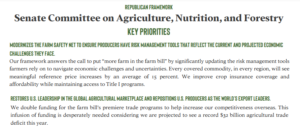The House Agriculture Committee unveiled a draft farm bill Friday that would revamp a key international food aid program, boost risk management options for specialty crop growers and nullify California's…
Senate Ag GOP Unveils Farm Bill Framework
Politico’s Meredith Lee Hill and Grace Yarrow reported Tuesday that “Senate Agriculture Committee Republicans released their farm bill proposal Tuesday, which would significantly expand farm safety net programs, setting up a major clash with Democrats.”
“The legislative framework, which outlines various policy priorities but does not contain bill text, largely mirrors the GOP-led House farm bill, which advanced out of committee with the help of four Democratic votes last month,” Lee Hill and Yarrow reported. “And it serves as a counter-proposal to Senate Ag Chair Debbie Stabenow’s (D-Mich.) rival farm bill framework, which focuses on crop insurance but would not also boost crop reference prices.”

“Sen. John Boozman (R-Ark.), the top Republican on the Senate Agriculture Committee, said Republicans’ framework will address the ‘headwinds’ facing farmers and the agriculture industry, including a steep forecasted drop in farm incomes, a spike in input costs and the country’s growing agricultural trade deficit,” Lee Hill and Yarrow reported. “‘Just doing something to do something is not going to make a difference,’ Boozman said during a briefing with reporters Tuesday, adding he wants to make sure there is a ‘meaningful’ boost to farm safety net programs, including crop insurance and reference prices.”
What’s In the Framework?
Agri-Pulse’s Philip Brasher reported Tuesday that “Boozman’s proposal, which calls for an average 15% increase in Price Loss Coverage reference prices to account for increases in input costs since they were first set a decade ago, differs sharply from an outline Senate Ag Chairwoman Debbie Stabenow, D-Mich., released May 1.”
“In line with the House bill, Boozman is proposing to restrict USDA’s Commodity Credit Corporation spending authority and to require that future USDA updates of the Thrifty Food Plan be cost neutral. TFP is a model of food costs that is used to set SNAP benefits,” Brasher reported. “Boozman also is proposing to move Inflation Reduction Act conservation funding into the bill and to remove restrictions that limit the money to climate-related practices.”
“The proposed new PLC reference prices for individual commodities were not released, but the summary of the plan notes that the escalator provision for reference prices also would be modified. The effective reference price in any given year would be 88% of the five-year Olympic average market price for the commodity, capped at 20% above the statutory reference price. The escalator is currently capped at 15%,” Brasher reported. “The summary also says that the Agriculture Risk Coverage program coverage level would be increased but doesn’t say by how much.”
Brasher wrote that “other highlights of Boozman’s proposal that align with the House legislation:
- It increases premium subsidies for the Supplemental Coverage Option to 80% and raises the top coverage level to 90%.
- Funding for the Market Access Program and Foreign Market Development Program would be doubled.
- Requires that at least 50% of Food for Peace funding be used for procuring and shipping U.S.-grown commodities.
- States such as California would be barred from imposing production standards on livestock products produced in other states.
- Loan limits for direct and guaranteed operating and ownership loans would be increased.”
Full Text Not Expected to Be Released
Bloomberg Law’s Skye Witley reported Tuesday that “although committee Republicans drafted full bill text, they won’t be releasing it, Boozman told reporters at a closed-door briefing Tuesday morning. Committee spokesperson Patrick Creamer said it didn’t make sense for the minority party in the chamber to introduce a bill.”
In addition, Progressive Farmer’s Jerry Hagstrom reported Tuesday that “Boozman said he and other committee members ‘have to sit around the table like this and be serious about getting the farm bill done or agree to disagree and start working on an extension’ of the 2018 farm bill. The 2018 bill expired on Sept. 30, 2023, but has already been extended through Sept. 30, 2024.”





